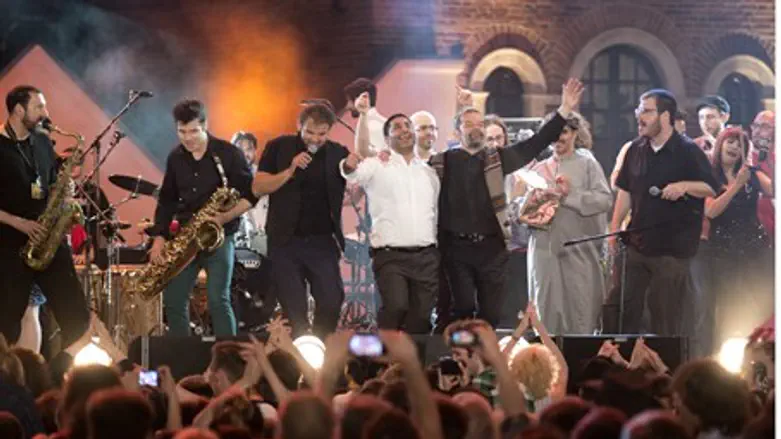
A foreigner visiting Krakow these days could easily think he had arrived in Tel Aviv by mistake. Concerts of Israeli music, Israeli movies, lectures on Israel, Israeli cooking workshops, Israeli dancing, and many more activities are taking place these days in the southern Polish city.
Running from June 27 to July 6, this is the 24h year that Krakow has hosted the world famous and first post-war festival dedicated to Jewish culture in Poland. Its aim was to bring back the memory of Poland’s Jews and their contribution to Polish culture.
Over the next ten days, thousands of local residents and tourists from all over Poland will attend the wide variety of events the festival offers. As in every year, the festival will close with the “Shalom on Szeroka Street” concert, which brings together thousands of locals and visitors from around the world for an open-air party in the heart of Krakow’s old Jewish quarter. The view of thousands of Poles dancing on the streets of Krakow to the sounds of Jewish Hasidic music is nothing less than amazing.
Among the performers this year are Ofer Vardi, a Journalist specializing in food and cookbooks, who will hold a lecture entitled “Kibbutz – Chadar Ochel” which will include memories and recollections from the Kibbutz, the musician Liron Amram and “The Panthers” will play on a boat that will cruise on the local Wisla river, the saxophonist Daniel Zamir will play in the local “Temple” synagogue and many other artists who will arrive in Krakow especially for the festival.
One of the most popular events every year is a Jewish cooking workshop. Malka Kafka, the owner of a kosher Jewish catering firm in Warsaw, will come to Krakow to teach the locals how to prepare Jewish food from different parts of the world. Every year, cooking enthusiasts from all over Poland arrive in Krakow to learn how to prepare gefilte fish, Kibbeh, Hummus and other traditional Israeli and Jewish dishes.
Janusz Makuch, 54, is the man behind the festival. In an interview with Arutz Sheva he explained how it all began.
“I was born in a city called Pulawy. I was never taught in school about Jews. When I was 14 years old I met a famous professor in a book shop. We started talking and he asked me if I knew that half of the population in Pulawy before World War II was Jewish. That was the turning point of my life. I started to be interested and learned about the Jewish history of my town and about Jewish traditions and culture. When I moved to Krakow to study at the University, I met with a group of friends who were also interested in Jewish culture, and one evening we decided to start a small Jewish festival in Krakow”.
Makuch and his friend started collecting films on Israel, invited a number of bands that played traditional Jewish music and, in 1988, the first festival got under way. Makuch says that he never imagined the festival would become such a hit from its first edition.
“The first edition of the festival took place in the tiny ‘Mikro’ movie theatre and consisted of a series of lectures and film screenings. We thought that maybe a few people would come, but the cinema was packed. We couldn’t believe it.”
In its first years, the festival took place every biannually, but then the Polish Minister of Culture offered Makuch and his friends financial support from the Polish government so that it could become a yearly event. Today, the festival’s budget is $1 million, most of which is contributed by Jewish organizations around the world and the Polish government. With almost 30,000 participants annually, the festival is the largest and most diverse exhibition of what is important and creative in the contemporary Jewish world. “Shalom on Szeroka” Street is firmly established as the biggest Jewish concert stage in the world. It has become a cult event for Jewish music fans. During the seven-hour, televised concert, Jewish musicians present the complete landscape of Jewish music with thousands of guests dancing on the streets of the Jewish quarter of Krakow.
Kornelia Binicewicz is one of the dedicated people who help Makuch organize the annual festival.
“Every year I can see the positive change that the festival brings. When I visit Israel and invite artists and guests to the festival, more and more people are interested in coming. We want to open this festival mainly to the young people, because they are the future and we want to bring together Jews and Poles from all over the world through the festival. This is our way to make both sides forget the prejudices and we are trying to promote mutual understanding between Jews and Poles.”
About the festival which opened last Friday, she said, “This year we decided to focus on four motives in the Jewish culture: Kibbutz, Mizrach, Ashkenaz and Dibbuk. We try to bring all different spheres of the Jewish culture, connect as many different motifs of Jewish culture into one festival.”